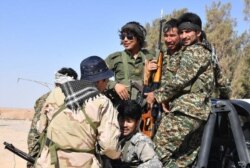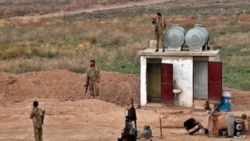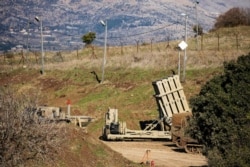Iranian forces continue to expand their military presence in parts of eastern Syria, a move, analysts say, that could undermine U.S.-led efforts in the fight against the remnants of the Islamic State (IS) terror group.
Iran, a major backer of Syrian President Bashar al-Assad's regime, controls parts of the eastern Syrian province of Deir el-Zour, particularly areas along the border with Iraq. With the help of thousands of foreign and local militiamen, Iran's elite Islamic Revolutionary Guards Corps (IRGC) has consolidated its hold over a large territory in Syria since the beginning of the country's civil war in 2011.
The United States in 2019 designated the IRGC as a foreign terrorist organization for its destabilizing role in the Middle East.
Recruitment efforts
In recent weeks, Iran has stepped up efforts to recruit local men into its militia ranks in Deir el-Zour, local news media said.
"In addition to its foreign Shi'ite militias such as al-Fatemiyoun and al-Zainabiyoun, Iran has been recruiting local Syrians to become part of its Syrian militias," said Omar Abu Layla, director of Deir Ezzor 24, a news and research group focused on developments in eastern Syria.
"Iran pays a monthly salary of $200 to those who join its militia force," he told VOA, adding that, "many locals in eastern Syria have already joined the Iranian-backed force."
Al-Fatemiyoun Brigade is an Afghan Shi'ite militia backed by Iran, a major regional Shi'ite power, that has been fighting in the Syrian war on behalf of Tehran. Al-Zainabiyoun Brigade is another Iranian-backed Pakistani Shi'ite group that has also been involved in the Syrian conflict.
Most of the newly recruited men in eastern Syria reportedly fight under the banner of the Baqir Brigade, a Syrian Shi'ite militia that was founded by Iran in the early years of Syria's war.
While Russian and Syrian government troops control major population centers in Deir el-Zour province such as the provincial capital of the same name, Iran remains in control of smaller towns on the western bank of the Euphrates River, including a strategic border crossing with Iraq.
Undermining stability
U.S.-backed Syrian Democratic Forces (SDF) have been in control of the eastern side of the river since March 2019 after defeating IS's so-called caliphate.
SDF-held territory in eastern Syria, however, has often been a target for IS sleeper cells and other armed groups.
The SDF also has accused the Syrian regime and its Iranian allies of causing chaos and instability in areas formerly occupied by IS militants.
"Iran is threatening stability in areas under our control in eastern Syria," a senior SDF official, who requested anonymity, told VOA.
"For example, Iran and its allies have carried out assassinations against Arab tribal leaders in Deir el-Zour in an attempt to turn local tribes against us and against the Americans," he said, noting that, "for this purpose, the Pasdaran (IRGC) is using individuals who used to work with (IS) while also recruiting new ones."
The SDF official added that since taking control of parts of eastern Syria, Iran has begun a "massive campaign to convert local Sunni Muslims to Shi'ite Islam in order to secure their loyalty."
He said such moves not only complicate their efforts in the fight against IS militants but also make a political settlement for Syria's decadelong conflict more elusive.
Geostrategic significance
The region Iran controls in eastern Syria is of geostrategic importance for its expansionist ambitions in the broader Middle East, experts say.
The Iranians "see it as a place that not only secures their presence to Lebanon and through Syria, but it also forms a buttress when it comes to Iraq," said Phillip Smyth, a researcher at the Washington Institute for Near East Policy who closely follows Iranian-backed militias in the Middle East.
"It creates a good base for them to jump off from," he told VOA, adding that now that Iranian forces "are trying to control all the major road networks through Iraq, and through Anbar province, in particular, they've just heavily reinforced it, put their most loyal units and built up a lot of local groups that really have tried to push anyone else out."
By doing so, Smyth argued, the Iranians believe they would make it harder for the U.S. to counter their presence in Iraq in the future.
Abu Layla of Deir Ezzor 24 said Iran also has been using its presence on the Syria-Iraq border as an important point for its overland route to transport weapons and personnel to its bases in other Syrian provinces.
Threatening Israel
Israel, which views Iran's military presence in Syria as a threat to its national security, has occasionally carried out strikes against Iranian targets in eastern Syria and elsewhere in the war-torn country.
Last week, Israel launched airstrikes against several Iranian-linked targets in Syria, the Israeli military said.
Some experts say Iran has been seeking to carve out a land corridor from Iraq through eastern Syria to Damascus and the Golan Heights to threaten Israel.
"This is a growing threat, because Iran can place missiles and drones in this area, especially precision-guided munitions," said Seth Frantzman, a Middle East expert based in Jerusalem.
He told VOA that Iran has made major advances in missile and drone technology and "wants to put these weapons in place to threaten Israel."
The Israeli military said last week's attacks in Syria were in response to an Iranian-sponsored operation in which explosives were planted near an Israeli military base in the Golan Heights.







